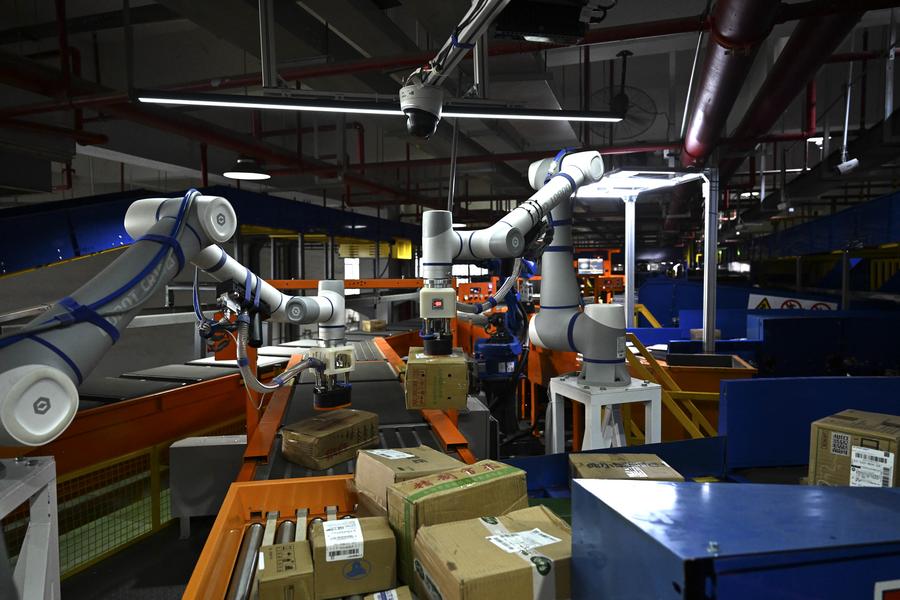China driving global express development
Industry looks to tech innovation to accelerate growth in delivery market


China remained the world's largest express delivery market in 2024, accounting for 65 percent of global parcel volume, according to the Global Express Development Report (2025) released on Tuesday in Zhejiang province.
The report, unveiled at the 6th Express Delivery Industry Conference in Tonglu, Zhejiang, shows China has extended its leadership for an 11th consecutive year, reinforcing its role as the primary engine of global parcel market expansion.
The report found that global express and parcel services handled 267.9 billion items in 2024, up 17.49 percent year-on-year, while industry revenue grew 14.05 percent to 4.61 trillion yuan ($648 billion).
China alone processed 175.08 billion parcels, an increase of 21.5 percent, with sector revenue rising 13.8 percent to 1.4 trillion yuan. The country's express market also stabilized at a historic scale of more than 10 billion parcels per month, a level unmatched worldwide.
"China's share of global express parcel volume has climbed to 65 percent, making it the key driver of the sector's global expansion," said Xie Momei, deputy director of the international business department at the Development and Research Center of the State Post Bureau.
Despite complex global conditions — including geopolitical tensions, an uneven economic recovery, and environmental risks — strong e-commerce growth continued to fuel parcel demand worldwide, Xie noted. She added that the express industry has significantly improved its quality and sustainable development, becoming one of the most efficient and technologically advanced logistics systems globally.
The report forecasts that global parcel volume is likely to exceed 300 billion pieces this year, with worldwide revenue poised to surpass 5 trillion yuan.
Industry leaders said China's domestic performance this year further reflects the sector's resilience. According to Gao Hongfeng, president of the China Express Association, China's parcel volume surpassed 150 billion items by Oct 11, reaching the milestone 37 days earlier than in 2024.
During this year's "Double 11" online shopping festival, postal and express enterprises handled 13.94 billion parcels from Oct 21 to Nov 11, with an average daily volume of 634 million, or 117.8 percent of normal levels.
The peak single-day volume soared to 777 million items, setting a new national record for daily parcel handling.
"This demonstrates the steady growth of China's consumer market and the express industry's crucial role in supporting the unified national market," Gao said. He called for placing technological innovation at the core, accelerating intelligent upgrades, and promoting large-scale applications of unmanned delivery, smart cloud warehouses, and low-altitude logistics as the sector shifts from high-speed growth to high-quality development.
Express companies are already moving quickly in this direction. Lai Meisong, chairman of ZTO Express, said artificial intelligence is now applied across the entire logistics chain, enabling the digitalization of "every vehicle, every worker and every parcel".
Lai noted that ZTO's per-parcel transfer cost dropped from 1.26 yuan in 2016 to 0.63 yuan in the first half of 2025, while the average express delivery price in China declined from 12.7 yuan to 7.5 yuan over the same period. "This has freed up more than one trillion yuan in value that ultimately flows back to businesses and consumers," he said.
At ZTO's Tonglu sorting hub, eight Neolix autonomous vehicles have already been put into operation. Tang Rong, manager of the facility, said the driverless vehicles increased overall site efficiency by about 70 percent and significantly reduced labor costs.
Each Neolix vehicle can handle the workload of three drivers and operates around the clock. A typical 60-kilometer delivery run costs about 15 yuan in electricity, compared with at least 50 yuan in fuel for a traditional vehicle covering the same distance.
Tang added that the sorting hub plans to expand its fleet to 15 Neolix vehicles next year, further improving delivery times and operational stability.
luowangshu@chinadaily.com.cn
- China driving global express development
- Xi Focus: Leading China's drive to enhance law-based governance
- Nation willing to share afforestation successes to combat climate change
- New drug used to treat common infection
- 'Group-style' aid program transforming healthcare in Xizang
- Warning systems aid Fujian fishermen





































